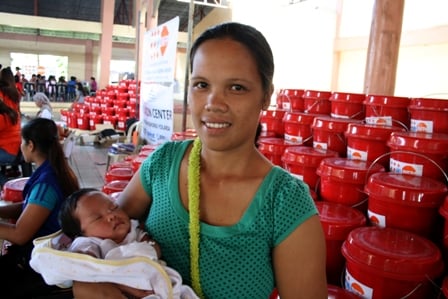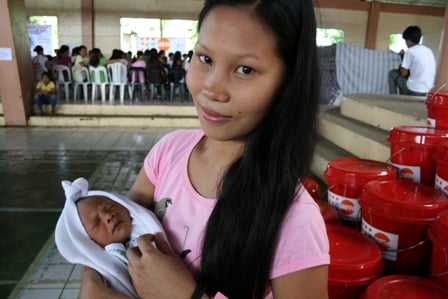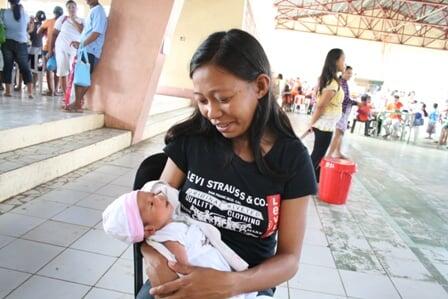ROXAS, Capiz, Philippines—“We were evacuated to the church. We were afraid and I feared for my baby. The church was crowded and there was no space to lie down, so we couldn’t sleep until the typhoon passed,” explains Geraline. She is one of the survivors of Typhoon Haiyan in the municipality of Ivisan. She is also one the 1,000 women who deliver every day in the areas affected by the tropical storm.
Geraline had her baby girl two weeks after Haiyan hit the Philippines and she was lucky: the rural health unit from her village was not damaged and she could deliver her baby safely.
This was also the case for Joan. She delivered baby Princess Aya in a health facility. “When the typhoon was forecast I was really worried because it was the same time as my due date, the 8th of November,” she explains. That was the day Haiyan hit Capiz province, but Joan eventually had her baby one week later, though she feared the worst.
On the other hand, Maria Pauline delivered at home, like 40 per cent of Philippine women usually do. “A midwife came to our place to help me. I decided to have the baby at home because it was 9 p.m. and I was worried that I would not find transportation to get to the health unit on time,” Maria Pauline recalls.

Geraline, Joan and Maria Pauline came to one of the medical missions organized by UNFPA, the United Nations Population Fund, to reach pregnant and lactating women and girls in the areas most affected by Haiyan.
They visited the mission so their babies could have a complete checkup for the first time. Around 100 people including local nurses, doctors, midwives and youth volunteers facilitated the missions.
Around 850 women and girls visited the UNFPA medical missions in Capiz province. Besides the health services, visitors also had the opportunity to attend information sessions on sexual and reproductive health and family planning. Special spaces were also set up to raise awareness of gender-based violence, providing participants key information on how to protect themselves and how to report these cases. As part of the medical mission, UNFPA distributed to women and girls dignity kits, with hygiene items and other articles necessary for their daily life.

“We provide women and girls with the basic health and protection information to take care of their children and themselves,” explains Dr. Angel Umali, UNFPA Maternal Health Officer, in charge of coordinating the various medical missions in Capiz. “We bring to them a team of health and protection experts, so they can receive medical and counseling services that might not be in place due to the emergency situation but that can be life saving.”
UNFPA estimates that around 270,000 are affected by the current humanitarian emergency in the Philippines. Besides organizing reproductive health medical missions, UNFPA is supporting local, provincial and national authorities to address health systems’ needs through the provision of equipment, medicines and special trainings to health workers.


